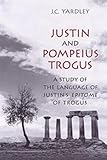Justin and Pompeius Trogus : A Study of the Language of Justin's "Epitome" of Trogus / J.C. Yardley.
Material type: TextSeries: Phoenix Supplementary Volumes ; 41Publisher: Toronto : University of Toronto Press, [2003]Copyright date: ©2003Description: 1 online resource (305 p.)Content type:
TextSeries: Phoenix Supplementary Volumes ; 41Publisher: Toronto : University of Toronto Press, [2003]Copyright date: ©2003Description: 1 online resource (305 p.)Content type: - 9780802087669
- 9781442676473
- 938/.07/0922
- PA6445.J8 Y37 2003eb
- online - DeGruyter
| Item type | Current library | Call number | URL | Status | Notes | Barcode | |
|---|---|---|---|---|---|---|---|
 eBook
eBook
|
Biblioteca "Angelicum" Pont. Univ. S.Tommaso d'Aquino Nuvola online | online - DeGruyter (Browse shelf(Opens below)) | Online access | Not for loan (Accesso limitato) | Accesso per gli utenti autorizzati / Access for authorized users | (dgr)9781442676473 |
Browsing Biblioteca "Angelicum" Pont. Univ. S.Tommaso d'Aquino shelves, Shelving location: Nuvola online Close shelf browser (Hides shelf browser)

|

|

|

|

|

|

|
||
| online - DeGruyter John Selden : Measures of the Holy Commonwealth in Seventeenth-Century England / | online - DeGruyter Joyces Mistakes : Problems of Intention, Irony, and Interpretation / | online - DeGruyter Just Words : Constitutional Rights and Social Wrongs / | online - DeGruyter Justin and Pompeius Trogus : A Study of the Language of Justin's "Epitome" of Trogus / | online - DeGruyter Kant's Intuitionism : A Commentary on the Transcendental Aesthetic / | online - DeGruyter Keeping the Lakes' Way : Reburial and Re-creation of a Moral World among an Invisible People / | online - DeGruyter Kill and Chill : Restructuring Canada's Beef Commodity Chain / |
restricted access online access with authorization star
http://purl.org/coar/access_right/c_16ec
Around 200AD, Marcus Junianus Justinus produced an abridged or 'epitomized' version of the Philippic Histories of the Augustan historian Pompeius Trogus. In doing so, he omitted all he did not find either intrinsically interesting or of use for historical examples. Over the centuries that followed, the abridgement eclipsed the original work in popularity, to the extent that Trogus' original work vanished and only Justin's version survived. In this investigation of the language of the Epitome, the first in almost a century, J.C. Yardley examines the work to establish how much of the text belongs to Trogus, and how much to Justin. His study compares words and expressions used in the Epitome with the usage of other Roman authors, and establishes areas where diction is similar to Augustan-era Latin and less in use in Justin's time. Yardley's extensive analysis reveals that there is more of Justin in the work than is often supposed, which may have implications for the historical credibility of the document. Yardley also demonstrates how much Trogus was influenced by his contemporary Livy as well as other Roman authors such as Sallust and Caesar, and how the Epitome reveals the influence of Roman poetry, especially the work of Virgil.
Mode of access: Internet via World Wide Web.
In English.
Description based on online resource; title from PDF title page (publisher's Web site, viewed 01. Nov 2023)


